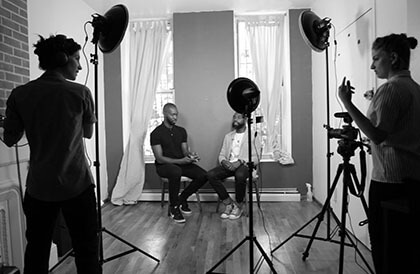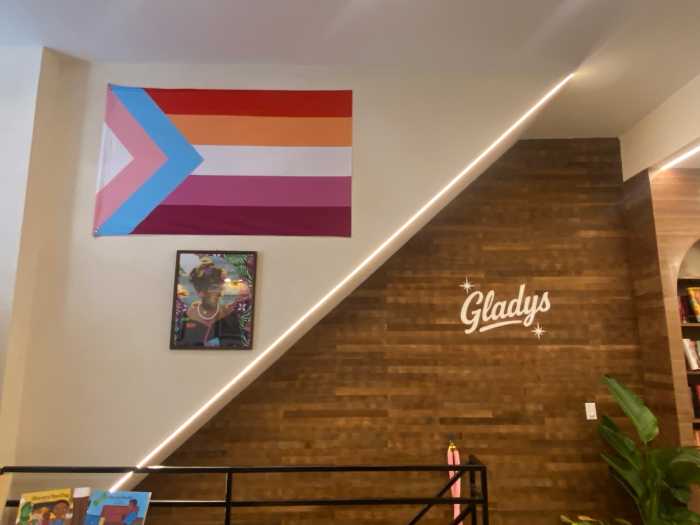“SIGNIFIED” co-creators and directors Jessie Levandov and Anna Barsan. | SIGNIFIED
BY BRIAN MCCORMICK | Who gets to tell our stories and why does it matter? It’s 2014 and Laverne Cox, the breakout trans star of the Netflix hit “Orange Is the New Black,” just made the cover of Time magazine. LGBT and queer characters are everywhere you look — and more and more they reflect and represent the real diversity of our communities. Don’t they?
Certainly, we’ve made progress since the days of Uncle Arthur from “Bewitched” and Jack McFarland from “Will and Grace.” But cultural hegemony remains a critical factor, and for the most part, the portrayals we see — we engage with — are dominated by an “It Gets Better” mentality informed by a mainstream, First World, white perspective.
Cameron on “Modern Family” is portrayed by a straight white male. Kima and Omar, complex gay black characters on “The Wire,” were written by a straight white male. Jenji Kohan, creator of “Orange Is the New Black,” is a straight white female. Self-narrative matters. This is not all we are.
Whose stories? Our stories. This is “SIGNIFIED”
On the documentary side of TV, for 20 years we had “In The Life.” At a time when LGBT people were virtually invisible in media, it was the first — the only — to regularly broadcast images and stories of our history and experience. “ITL” gave a human face to the AIDS crisis and showed the world that gay people could get angry and fight back. It gave voice to those not heard by the mainstream media, even as it became, itself, part of the gay mainstream.
In the fall of 2011, about a year before the final episode of “ITL” aired, Anna Barsan, 28, and Jessie Levandov, 26, premiered the first series of interviews for their project “SIGNIFIED” at the Guggenheim Lab, a mobile laboratory that focuses on urban life. “SIGNIFIED” was and is a direct response to what the creators saw as a tendency toward assimilation in queer media.
“Instead of telling queer youth, it gets better,” said Levandov, “we should be affirming who they are now.”
Twenty episodes on, “SIGNIFIED” has grown into a multi-media space for LGBTQ testimony and documentary, featuring the work of queer artists, scholars, and activists. Notable interviews include “queer black feminist troublemaker” Alexis Pauline Gumbs of the Mobile Homecoming Project, spoken word artist Emanuel Xavier, and the HIV/ AIDS activist collective Queerocracy.
Season 3 focuses on LGBTI experiences in Latin America: what it means to be lesbian in Bogota; living with HIV and AIDS in Cuban prisons; and performance from Buenos Aires trans “artivista” Susy Shock. All episodes are available in both English and Spanish.
For Barsan, Levandov, and the other “SIGNIFIED” team members — producer Sam Tabet, director Carmen Torres, and motion graphics designer Erin Culton — the project isn’t just about increasing visibility or about queer people making queer media, but responding to assurances that it gets better with the question, “What is better?”
“Visibility is important… being able to see queer sex and sexualities is important,” Barsan said. “But the reason we are asserting our presence is that access to queer content and queer media is still dominated by a white, upper-middle-class perspective. It isn’t politically challenging. It doesn’t question the system. ”
“In the quest for marriage equality,” Levandov added, “we are reproducing the model of the patriarchy.”
Both makers emphasized the importance of considering race and class together with sexuality and sexual orientation.
“It’s important to our work to deconstruct our privilege, to look at how power is connected to our queerness and to media,” said Barsan. “Our privilege plays into everything we do.”
Levandov emphasized, “We also need to be able to ask other questions, to know that our solidarity can exist beyond our sexuality.”
That is potentially a daunting challenge.
Jessie Levandov and Anna Barsan interviewing writer and activist Darnell Moore and playwright Tarell McCraney. | SIGNIFIED
“Being amongst this community of educators, activists, artists, arts educators, healers, and academics, we are also held to a certain standard, “Barsan explained, “not only in terms of how are we reflecting communities, but why we are creating this.”
For “SIGNIFIED,” the work comes down to a question of queer self-determination.
“It is not enough for us to negate, or resist, or be in opposition to,” said Levandov. “We have to experience these stories in live spaces. We have to pay tribute to our elders.”
“[‘SIGNIFIED’] is not just media to watch,“ Barsan said. “We are offering dialogue and language. We do a lot of screenings, workshops, media training, and parties in tandem with releases. Workshops are organized around themes such as race, the capitalist system, how to grow community, how to create together, and how to connect our disparate communities.
The latest episode, “Queer Archive,” is “a departure from past episodes,” said Levandov.
It uses archival documentary and television footage from the 1950s through today as a means of showing the changing representations of homosexuality and the expanded tent of gender queerness, sexuality, and intersectionality. Mixing in the new and old, the goal was to “reactivate the text,” Levandov explained.
In making this video, Barsan and Levandov discovered “how difficult it is to find and access our history,” Levandov said. Now, she added, “the adolescent phase of the project,” aims to address this.
“Queer Coordinates,” a new initiative at “SIGNIFIED,” will be a virtual archive of queer media geographically mapped based on where the content originated. What Jonathan Ned Katz’s textual work did documenting historical changes in the social organization of sexuality in the US, “Queer Coordinates” aims to do for representations of queer communities and their movements worldwide, through an online mapping database.
“And not just LGBTQI,” explained Levandov, “but different movements connecting different stories in time.”
“If we are only looking at things labeled as queer,” Barsan said, “we are missing out on a lot.”
“SIGNIFIED” aims very high.
“It will be a radical and imaginary space for new sexuality and gender systems to flow through,” Levandov asserted.
Barsan agreed, saying, “That space beyond that Audre Lorde, Gloria Anzaldúa, and Octavia Butler talked about. A space of celebration.”



































